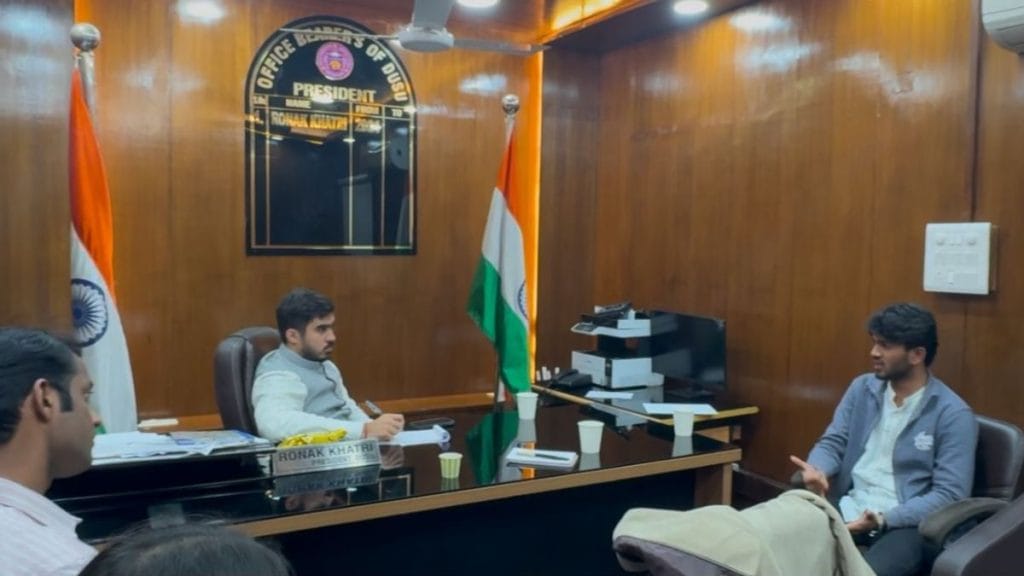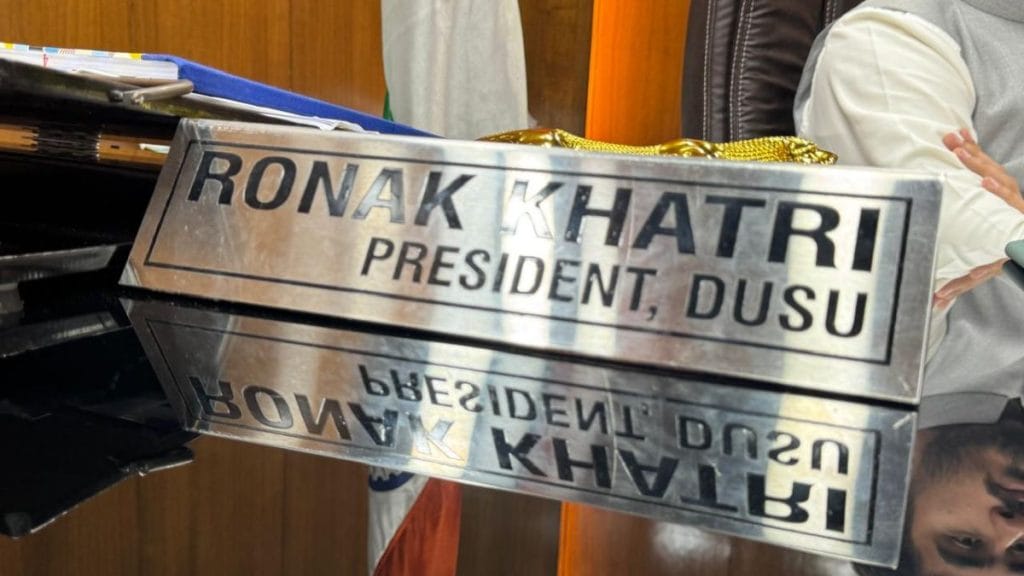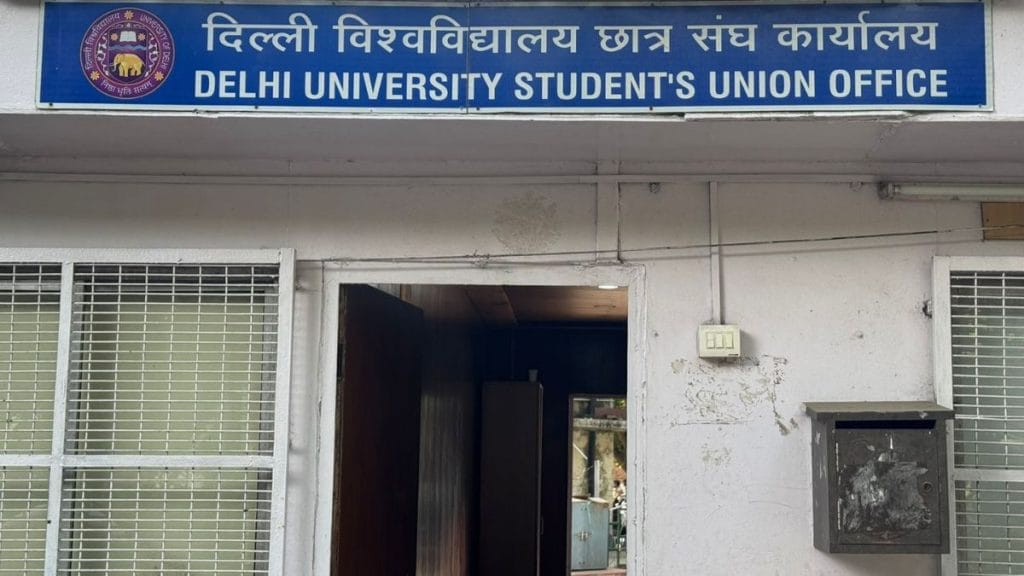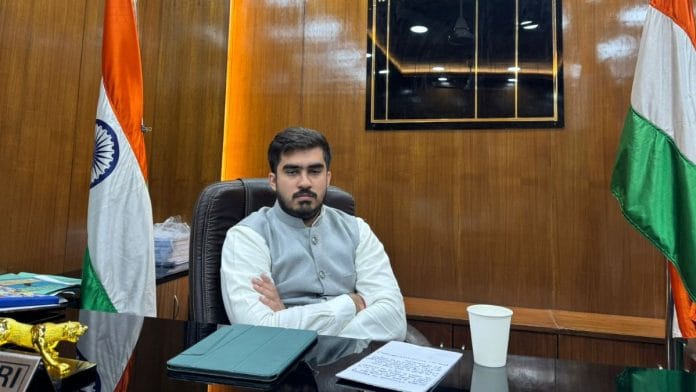New Delhi: Ronak Khatri sits in a black, high-back rotating chair, surrounded by symbols of authority. The Indian tricolour stands on his desk, and his name shines in gold on a plaque. It has all the makings of a District Magistrate’s office, but it belongs to the 23-year-old president of the Delhi University Students’ Union. Gone are the days of khadi-denim-wearing scrappy student leaders shouting slogans of Mao, Marx and Ho Chi Minh battling water canons and police lathis.
He rings a bell on his black glass table and a dozen students seated on the black leather sofa outside spring into action. They have a laundry list of complaints in hand.
“Think of it as a DM office only,” Khatri laughed, adjusting his grey Nehru jacket paired with a white shirt.
With the National Students’ Union of India (NSUI) returning to power in the university after seven years, the new president has quickly become a face of controversy. From heckling the Dean of the Faculty of Arts over exam delays to walking into a cafe in Kamla Nagar and ordering the owner to shut down hookah services and most recently, launching a surprise inspection of the Delhi University’s hostel washrooms, Khatri’s brand of student politics is straight out of a South Indian movie featuring a swashbuckling masculine hero who uses aggressive high-visibility high-volume crackdown to bring change. And Khatri ticks all the boxes: he is assertive, speaks with a bold Haryanvi tinge in his Hindi, and is constantly flanked by a lobby of half a dozen men. And when he’s on the road, five to six SUVs and jeeps follow his Fortuner.
A third-year law student, Khatri is a Gen Z president who knows the power of reels. His Instagram account, boasting 1.3 lakh followers, is maintained by his friend who runs a political consultancy. The account keeps students updated on his daily activities—from campus visits and checking food facilities in canteens to free book campaigns and cleanliness initiatives.
I am aggressive only against wrong things. If a professor walks into the university drunk and delays an examination affecting over 60 students, shouldn’t I confront him?
Ronak Khatri, DUSU president
All his videos start with him saying, “Inquilab saathiyon (Revolutionary greetings, friends)”. Each reel has a gritty Bollywood song playing in the backdrop. His first post after winning the election featured a Kailash Kher song — ek ravana ka sanghar kiya (A Ravana has been defeated). Sidhu Moosewala is another constant, along with other Punjabi singers such as Karan Aujla and Sukhwinder Singh. In one of the videos, recorded on the death anniversary of Maharaja Suraj Mal—a Jat ruler—he urges Jats to stay united and not be divided along party lines. The video features the song Jat Drip by Khasha Aala Chahar. It has 26.7K likes and over a thousand shares.
With an Apple watch strapped to his wrist, iPhone in his hand, an iPad on his desk and a royal Bengal tiger figurine resting on desk, Khatri is symbolic of what Delhi University’s student politics has come to be—money, power, and fame.
In the two months since he won the DUSU election with 1,300 votes, Khatri has given a tashan-shaped makeover to a student leader’s identity.

“I am aggressive only against wrong things. If a professor walks into the university drunk and delays an examination affecting over 60 students, shouldn’t I confront him?” he asked, adding “The professor agreed that he was drunk.”
He has ruffled the Delhi University campus. In yet another video, Khatri is seen walking into the hostel of Aditi College as part of a surprise inspection. His team records him highlighting the dilapidated urinals. He is also seen asking a female student to check the sanitary pad vending machine, which doesn’t work.
The video went viral clocking over 5 lakh likes, more than 2,000 comments, and 69,000 shares. The caption reads, “Your President, Your Voice”. One comment reads, “Bhai ne system hila ke rakha hai.” (Brother has the system shaking).
While his supporters praise his bold approach, professors say that Delhi University has come to increasingly reflect the rise of hyper-masculine politics. And the new president, they say, is no exception.
“Unionism means articulating your rights and fighting for larger issues in a constructive manner. But what we are seeing is the rise of masculine politics on campus. And it didn’t start with Ronak—it began a few years ago, but he is certainly a product of it,” said Abha Dev Habib, associate professor at Miranda House.
Delhi University has long been a launch pad for national leaders including Arun Jaitley, Ajay Maken, and Shashi Tharoor. Then came a decade of student leaders like Umar Khalid, Shehla Rashid and Kanhaiya Kumar from JNU. However, Habib contends that today’s student politics marks a significant departure from the kind of politics that once nurtured the creation of leaders.
“What Ronak is showing is that he is ready to confront and beat any professor without dialogue. We thought we had moved away from the ABVP’s style of politics, and that there would be a change. But unfortunately, we are seeing the same kind of politics,” Habib expressed her frustration.
Also read: What Gandhi wanted from students—avoid politics, strikes
University is like a country
On 6 January, Khatri led a group of students to the office of Amitava Chakraborty, dean of the Faculty of Arts. He snatched the dean’s phone as he was trying to make a phone call and questioned his academic credentials. “How did you become the Dean? Who made you the Dean? Kiske talwe chaat ke aap yahan pahunche (who lobbied on your behalf)?” he asked as the students stood by quietly listening.
Hours later the dean resigned, saying that “it was a physically threatening environment… I was under immense pressure to resign as the students were unwilling to be pacified”. Different versions of what happened in the room between Khatri and the dean spread like wildfire, cementing the newly elected DUSU president’s reputation. Now, his office is always buzzing with students. Some want to file a complaint, while others want to take a photo with the new president.
What Ronak is showing is that he is ready to confront and beat any professor without dialogue. We thought we had moved away from the ABVP’s style of politics
Abha Dev Habib, associate professor, Miranda House
Eighteen-year-old Sakshi from Bihar joined Hansraj College in August. Within six months of her time at Delhi University, she found herself struggling with a laundry list of issues—mostly related to her accommodation. Finally, last month, she knocked on Khatri’s door for help.
Addressing her as “sister”, Khatri, who spends his afternoons in the DUSU office, jotted down Sakshi’s list of grievances: a PG owner refused to return her security deposit, cockroaches in the food, and the police’s failure to act on her complaints.
Khatri quickly dialled the Station House Officer (SHO). “I am the president of DUSU. My fellow student has been coming to you, sir. You registered an FIR but took no action. Do you want me to call your higher-ups?” Khatri said before hanging up the phone.
He then turned to Sakshi and reassured her, “I’m calling my friend. He will accompany you to the PG, and your work will be done.” Handing her a piece of paper, he added, “Give me your written complaint, and I’ll sign it.”
The students waiting in the room look at Khatri with awe.
University is like a country in itself, and a student president must ensure they are accessible to the thousands of students who might show up at their office at any time
Ronak Khatri
Every day, students pour into Khatri’s office with demands ranging from water coolers, better toilets and more sports equipment to protesting against fee hikes.
As a law student, Khatri’s approach to the problem is rooted in his legal training.
“First, send an email to the faculty for evidence,” he asked each student who came with a complaint. “Give the faculty a week to respond. Follow up with a call. If they still don’t act, we protest—and the DUSU president stands with you.”
Every two hours, Khatri takes a 15-minute break to unwind, respond to messages, and enjoy a hot cup of coffee. Sitting beside him is his younger brother, a recent Delhi University B.com graduate, who diligently manages Khatri’s packed schedule.
“University is like a country in itself, and a student president must ensure they are accessible to the thousands of students who might show up at their office at any time,” said Khatri.
Also read: DU’s Northeast students’ union fought prejudice with politics—now it’s pulling back at a price
A calculated decision
Khatri officially joined the National Students Union of India (NSUI), the student wing of the Indian National Congress, in 2024. And within months, he was the presidential candidate for the DUSU elections. Son of a businessman, Khatri lives in Narela and drives his black Fortuner to the University.
Be it Jawaharlal Nehru University (JNU), DU or Banaras Hindu University, becoming a student union president has always been associated with a certain prestige and influence. That’s why when Khatri won the election, he brought his parents to his office and made his mother sit in his chair. It marked the first step in his long political journey.

Khatri was in class 10 when he began writing speeches for his uncle who was running for office from the Narela assembly constituency. It sparked his interest in politics.
What drove him to choose NSUI is not only ideology but ambition too. It was a calculated decision, he said. ABVP and Left are rigid and AAP is not that big a party.
“There’s no freedom in ABVP or the Left; they’re just puppets following orders from central leaders. In NSUI, there’s less interference, and it’s a national party. By the time I enter mainstream politics, Congress will be back in power.”
Just like other student leaders, Khatri also harbours a dream of becoming a national politician. “In the next ten years, I see myself becoming the Chief Minister of Delhi,” he said.
These days, he is campaigning for Congress in New Delhi. Photos with Congress leaders including party president Mallikarjun Kharge, party treasurer Ajay Maken, MP Deepinder Hooda, former Rajasthan Deputy CM Sachin Pilot and NSUI president Varun Choudhary are plastered all over his social media. Most of these photos were clicked after Khatri became DUSU president.
There’s no freedom in ABVP or the Left; they’re just puppets following orders from central leaders. In NSUI, there’s less interference, and it’s a national party. By the time I enter mainstream politics, Congress will be back in power.
Ronak Khatri
He describes himself as a “Congress ka sipahi [soldier of Congress].” And for Congress, he is an emerging leader who has marked their return to Delhi University politics.
While he proactively raises student welfare issues, he keeps his distance from national and international issues such as communalism, disinvestment, Israel-Hamas war, etc. His concern is with air conditioners on campus, the quality of food in the mess and well-maintained toilets.
A professor who has been teaching at the university for the past 15 years called Khatri’s brand of politics “the politics of glamour”, as he sipped tea near a kiosk with a Khatri poster pasted on the wall.
“Such is the glamour of university politics that students begin to nurture big dreams.”
He paused and added, “But if you look closely, in the last few years, no big leader has emerged from Delhi University. We need to question this. Politics here is lost in glamour, drifting away from the groundwork. These so-called student leaders drive Scorpios, BMWs, and Mercedes,” he laughed.
Also read: Kerala student politics has even faculty scared. Violence reigns from Maharaja’s to KVASU
Harnessing social media
During his 2024 DUSU election campaign, Khatri earned the moniker “Matka Man” for placing water pots across campus during the scorching heat. He even filed a court petition to address the water crisis on campus. This, he said, is what led him to victory.
“For ABVP and other student organisations, water is a minor issue. But they fail to understand that water is a basic necessity. It’s shameful that we have to beg and fight for something so fundamental,” said Khatri.
But water isn’t the only factor in his victory. His social media reach played an important part. Khatri used his Facebook and Instagram accounts to reach out to the students. His reels were tailored to address their concerns. What made Khatri stand out from other leaders with significant social media followings was how he used these platforms.
In one video, after becoming the DUSU president, Khatri addressed the growing hookah culture among teenagers. During a surprise inspection, he and his team walked into a hookah cafe in Hudson Lane and discovered young teenagers smoking. He later met with DCPs and issued letters demanding a “smoke-free campus.”
The video is set to a suspenseful background score, as if Khatri is a police officer on a midnight raid. It garnered over 20,000 likes, 427 comments, and over 3,000 shares. Comments included, “This president was needed in DUSU for years”, “good initiative”.
In another video, Khatri is seen shouting at a head constable, “Teri naukri nahi chudwadi toh…(I will get you fired).” In the clip, he warned the police to take action against the hookah parlours. The video raked in 74,000 likes and 7000 shares.
Tin the last few years, no big leader has emerged from Delhi University. We need to question this. Politics here is lost in glamour
DU professor
“These days, everyone has a phone, so isn’t it right to reach them through the platform they use the most? I used social media during my campaign, and I continue to use it to update students on my initiatives,” Khatri told ThePrint.
While the opposition student organisation ABVP agrees that Khatri used social media smartly to reach out to the students, they say his promises and fame haven’t translated on the ground.
“Khatri became famous on social media during the election campaign but his promises are not visible on the ground. He promised water facilities on campus. There is still no water,” said a first-year student, associated with ABVP.
Rishabh Chaudhary, ABVP presidential candidate who lost to Khatri has 21,500 followers on Instagram as opposed to Khatri’s 1,30,000. Delhi University students said that after Khatri’s victory, the DU wing of ABVP has also started using social media aggressively.
Khatri knows social media initiatives are what work and he encourages presidents of various colleges to do the same.

“Launch ‘Mera College, Mera Sujaav’ on our campus and give me a list of problems from your university,” Khatri directs the ABVP president from Bhaskarcharya College.
After the meeting, as she stood up to leave, he added, “Ma’am, I know we are from different student unions. But we have been selected for our work. Let’s forget the differences during work.”
But not everyone is convinced that Khatri will bring about the revolution he promises. A PhD scholar researching the Constitution questioned whether a year is enough for Khatri’s lofty plans.
“Another few months, another election and Ronak will be replaced,” laughed a professor. “Students will still be struggling for basic necessities—water, toilets, food. Another president will come, make similar promises, and we’ll go through this cycle again. Meanwhile, we’ll keep teaching democracy.”
(Edited by Theres Sudeep)







Ronak Khatri comes across as a breath of fresh air.
Misguided ideologues like Abha Dev Habib love it when students hit the streets on issues which have absolutely no bearing on the day to day life of a student. For example, if Khatri were to protest against the Israelis and support Jihadi terrorist organizations such as Hamas and Hezbollah, she would be mighty pleased.
The fact that Khatri chooses to fight for actual issues which impact a student’s life, such as potable water on campus and clean toilets, is disappointing for her.
It’s refreshing to see young leaders full of promise rising in the NSUI. If groomed properly, they will be an asset for the Congress in future. The party desperately needs fresh faces with mass appeal.
As for the likes of Prof. Abha Dev Habib, the less said the better. She and others of her ilk will be happy and satisfied only when the Left unions win the DUSU elections. Irrespective of the quality and quantum of work being done by the current office-bearers, they will never earn her approval.